Organisational Behaviour Report for A David & Co Limited Analysis
VerifiedAdded on 2020/12/10
|17
|6141
|325
Report
AI Summary
This report examines organisational behaviour within the context of A David & Co Limited, a food and beverage company. It explores the influence of organizational culture, power dynamics, and workplace politics on employee behaviour, referencing Handy's culture model and Hofstede's dimensions of culture. The report evaluates various motivation theories and techniques, emphasizing their application in achieving business goals. It also delves into the factors that contribute to effective teamwork and contrasts them with ineffective team dynamics. Furthermore, the report applies philosophies and concepts of organisational behaviour, providing insights into how these elements impact overall organizational performance and employee satisfaction. The report highlights the importance of power delegation, flexible organizational cultures, and understanding workplace politics to improve performance and work quality. The report provides a comprehensive analysis of the chosen firm and the topics covered.
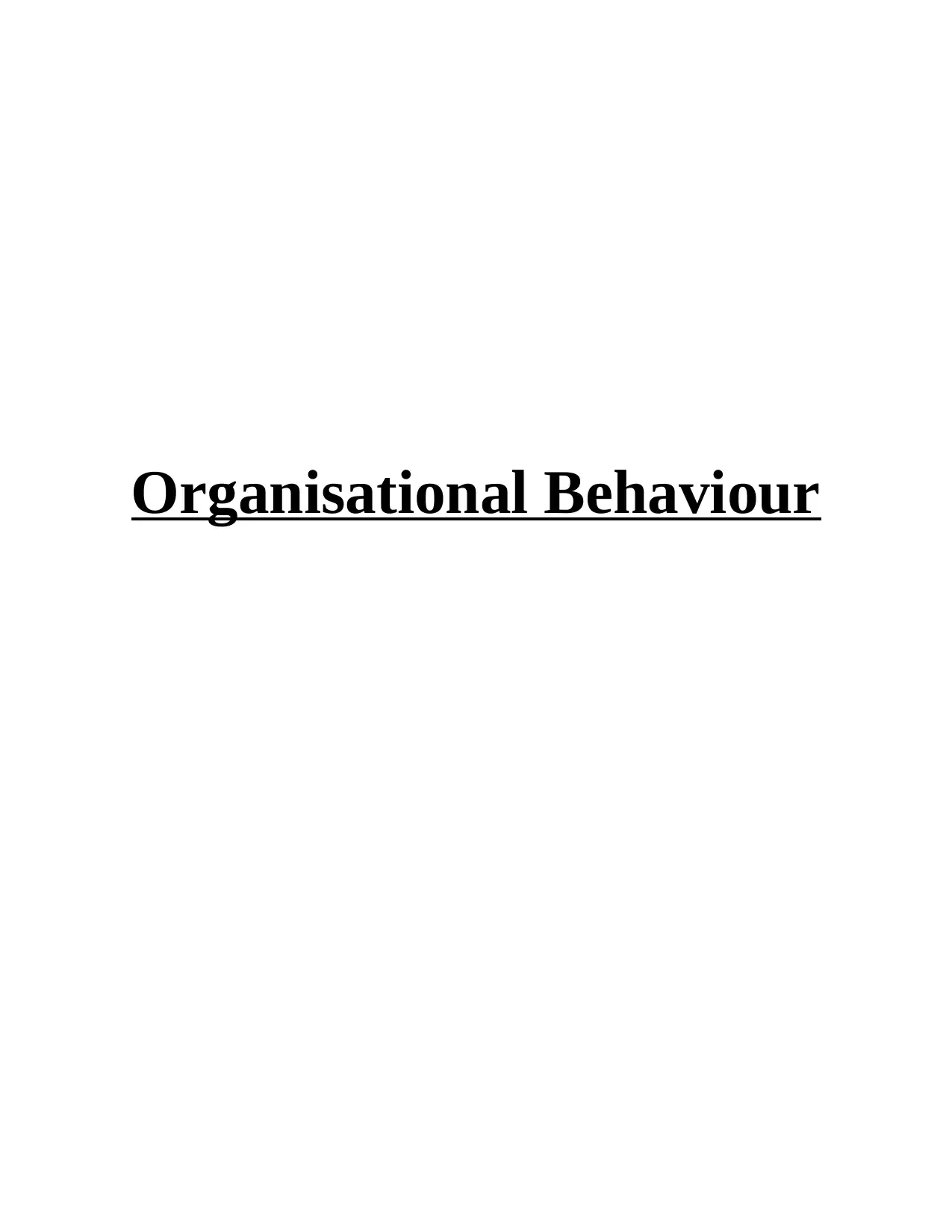
Organisational Behaviour
Paraphrase This Document
Need a fresh take? Get an instant paraphrase of this document with our AI Paraphraser
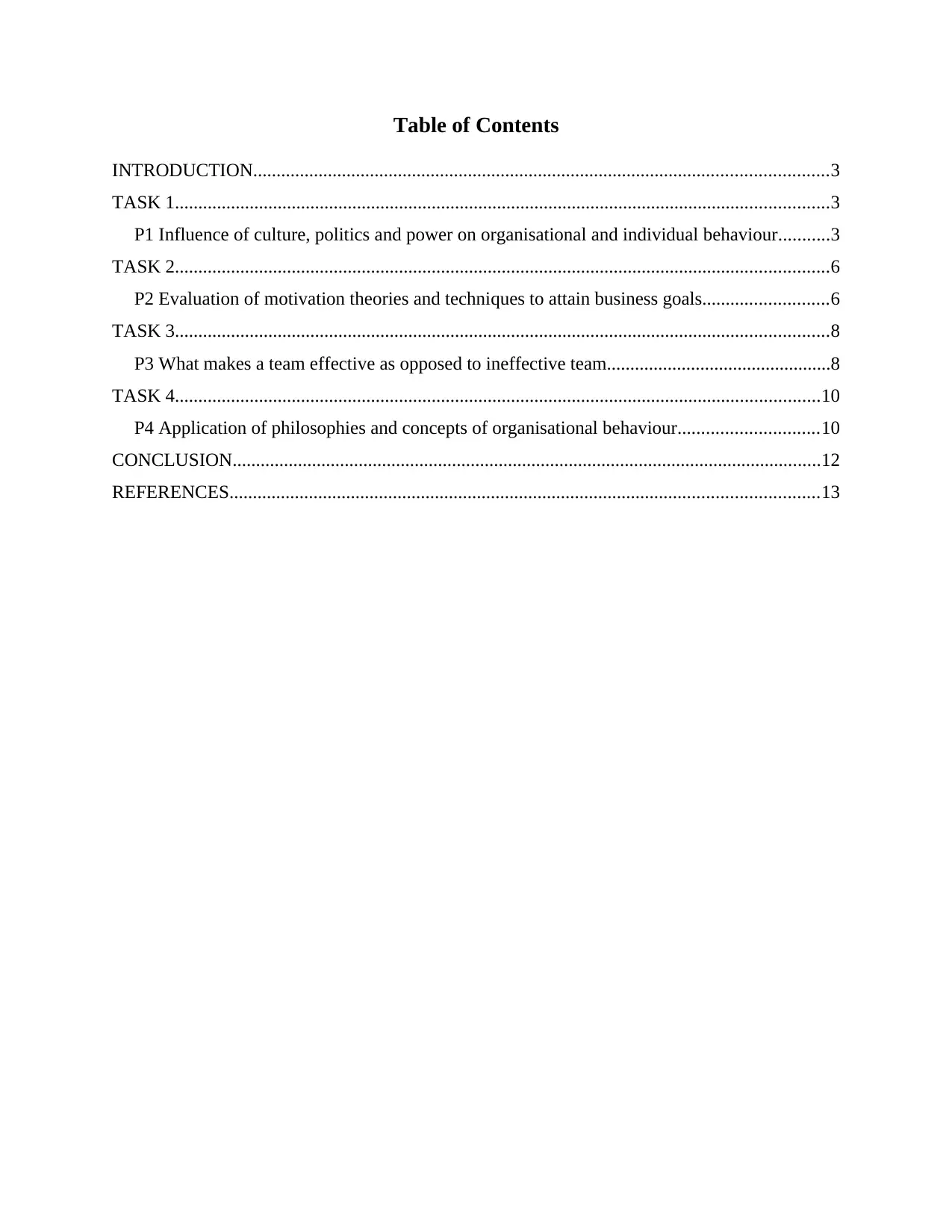
Table of Contents
INTRODUCTION...........................................................................................................................3
TASK 1............................................................................................................................................3
P1 Influence of culture, politics and power on organisational and individual behaviour...........3
TASK 2............................................................................................................................................6
P2 Evaluation of motivation theories and techniques to attain business goals...........................6
TASK 3............................................................................................................................................8
P3 What makes a team effective as opposed to ineffective team................................................8
TASK 4..........................................................................................................................................10
P4 Application of philosophies and concepts of organisational behaviour..............................10
CONCLUSION..............................................................................................................................12
REFERENCES..............................................................................................................................13
INTRODUCTION...........................................................................................................................3
TASK 1............................................................................................................................................3
P1 Influence of culture, politics and power on organisational and individual behaviour...........3
TASK 2............................................................................................................................................6
P2 Evaluation of motivation theories and techniques to attain business goals...........................6
TASK 3............................................................................................................................................8
P3 What makes a team effective as opposed to ineffective team................................................8
TASK 4..........................................................................................................................................10
P4 Application of philosophies and concepts of organisational behaviour..............................10
CONCLUSION..............................................................................................................................12
REFERENCES..............................................................................................................................13
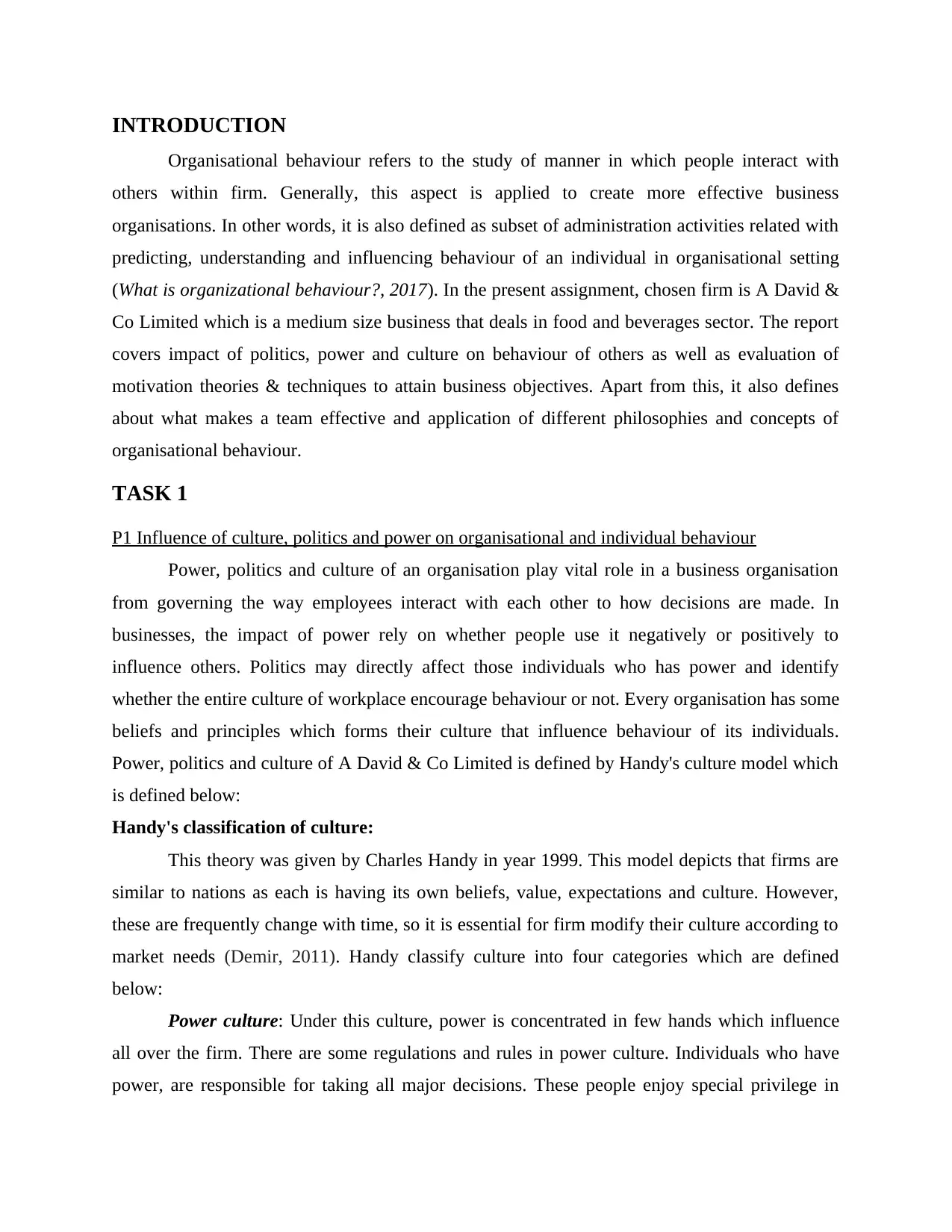
INTRODUCTION
Organisational behaviour refers to the study of manner in which people interact with
others within firm. Generally, this aspect is applied to create more effective business
organisations. In other words, it is also defined as subset of administration activities related with
predicting, understanding and influencing behaviour of an individual in organisational setting
(What is organizational behaviour?, 2017). In the present assignment, chosen firm is A David &
Co Limited which is a medium size business that deals in food and beverages sector. The report
covers impact of politics, power and culture on behaviour of others as well as evaluation of
motivation theories & techniques to attain business objectives. Apart from this, it also defines
about what makes a team effective and application of different philosophies and concepts of
organisational behaviour.
TASK 1
P1 Influence of culture, politics and power on organisational and individual behaviour
Power, politics and culture of an organisation play vital role in a business organisation
from governing the way employees interact with each other to how decisions are made. In
businesses, the impact of power rely on whether people use it negatively or positively to
influence others. Politics may directly affect those individuals who has power and identify
whether the entire culture of workplace encourage behaviour or not. Every organisation has some
beliefs and principles which forms their culture that influence behaviour of its individuals.
Power, politics and culture of A David & Co Limited is defined by Handy's culture model which
is defined below:
Handy's classification of culture:
This theory was given by Charles Handy in year 1999. This model depicts that firms are
similar to nations as each is having its own beliefs, value, expectations and culture. However,
these are frequently change with time, so it is essential for firm modify their culture according to
market needs (Demir, 2011). Handy classify culture into four categories which are defined
below:
Power culture: Under this culture, power is concentrated in few hands which influence
all over the firm. There are some regulations and rules in power culture. Individuals who have
power, are responsible for taking all major decisions. These people enjoy special privilege in
Organisational behaviour refers to the study of manner in which people interact with
others within firm. Generally, this aspect is applied to create more effective business
organisations. In other words, it is also defined as subset of administration activities related with
predicting, understanding and influencing behaviour of an individual in organisational setting
(What is organizational behaviour?, 2017). In the present assignment, chosen firm is A David &
Co Limited which is a medium size business that deals in food and beverages sector. The report
covers impact of politics, power and culture on behaviour of others as well as evaluation of
motivation theories & techniques to attain business objectives. Apart from this, it also defines
about what makes a team effective and application of different philosophies and concepts of
organisational behaviour.
TASK 1
P1 Influence of culture, politics and power on organisational and individual behaviour
Power, politics and culture of an organisation play vital role in a business organisation
from governing the way employees interact with each other to how decisions are made. In
businesses, the impact of power rely on whether people use it negatively or positively to
influence others. Politics may directly affect those individuals who has power and identify
whether the entire culture of workplace encourage behaviour or not. Every organisation has some
beliefs and principles which forms their culture that influence behaviour of its individuals.
Power, politics and culture of A David & Co Limited is defined by Handy's culture model which
is defined below:
Handy's classification of culture:
This theory was given by Charles Handy in year 1999. This model depicts that firms are
similar to nations as each is having its own beliefs, value, expectations and culture. However,
these are frequently change with time, so it is essential for firm modify their culture according to
market needs (Demir, 2011). Handy classify culture into four categories which are defined
below:
Power culture: Under this culture, power is concentrated in few hands which influence
all over the firm. There are some regulations and rules in power culture. Individuals who have
power, are responsible for taking all major decisions. These people enjoy special privilege in
⊘ This is a preview!⊘
Do you want full access?
Subscribe today to unlock all pages.

Trusted by 1+ million students worldwide
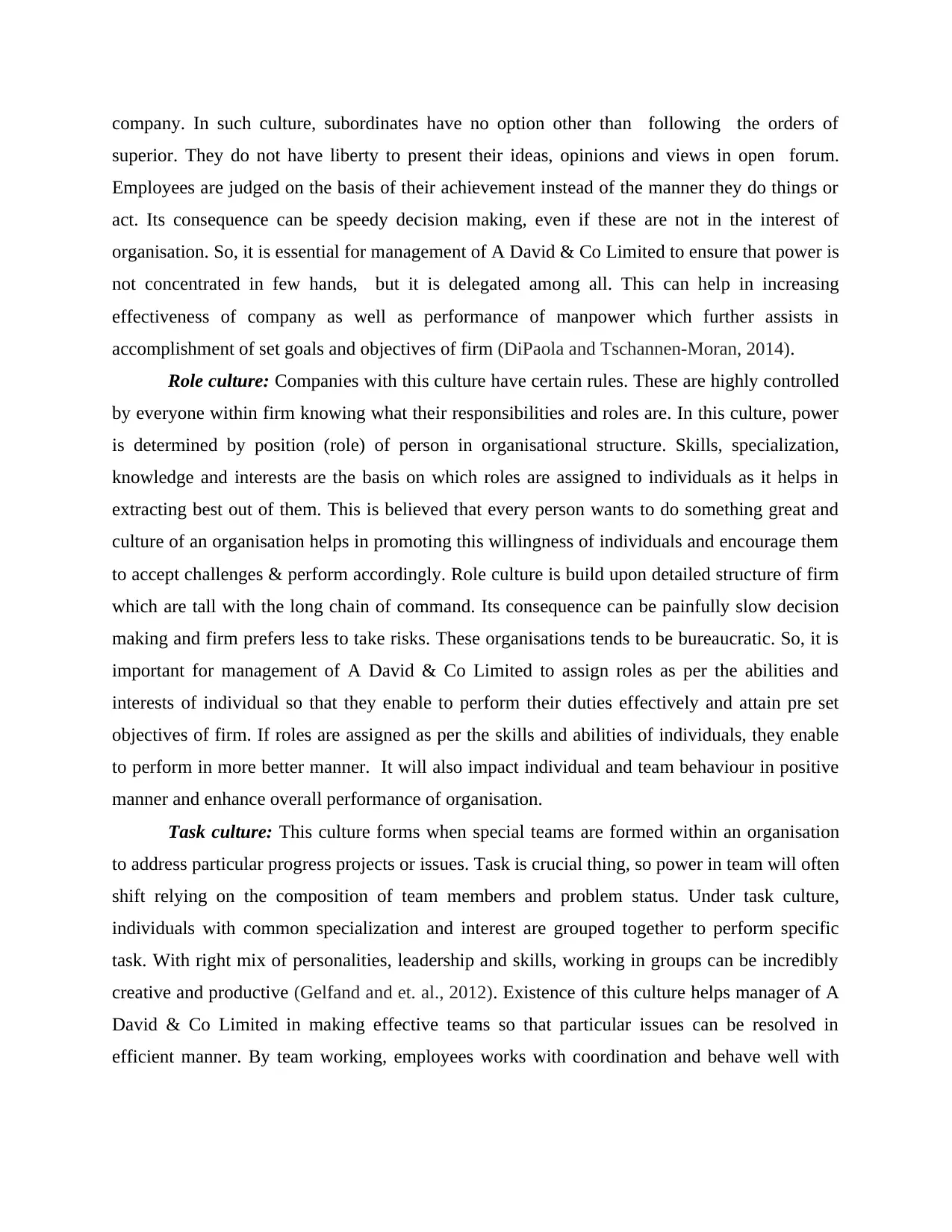
company. In such culture, subordinates have no option other than following the orders of
superior. They do not have liberty to present their ideas, opinions and views in open forum.
Employees are judged on the basis of their achievement instead of the manner they do things or
act. Its consequence can be speedy decision making, even if these are not in the interest of
organisation. So, it is essential for management of A David & Co Limited to ensure that power is
not concentrated in few hands, but it is delegated among all. This can help in increasing
effectiveness of company as well as performance of manpower which further assists in
accomplishment of set goals and objectives of firm (DiPaola and Tschannen-Moran, 2014).
Role culture: Companies with this culture have certain rules. These are highly controlled
by everyone within firm knowing what their responsibilities and roles are. In this culture, power
is determined by position (role) of person in organisational structure. Skills, specialization,
knowledge and interests are the basis on which roles are assigned to individuals as it helps in
extracting best out of them. This is believed that every person wants to do something great and
culture of an organisation helps in promoting this willingness of individuals and encourage them
to accept challenges & perform accordingly. Role culture is build upon detailed structure of firm
which are tall with the long chain of command. Its consequence can be painfully slow decision
making and firm prefers less to take risks. These organisations tends to be bureaucratic. So, it is
important for management of A David & Co Limited to assign roles as per the abilities and
interests of individual so that they enable to perform their duties effectively and attain pre set
objectives of firm. If roles are assigned as per the skills and abilities of individuals, they enable
to perform in more better manner. It will also impact individual and team behaviour in positive
manner and enhance overall performance of organisation.
Task culture: This culture forms when special teams are formed within an organisation
to address particular progress projects or issues. Task is crucial thing, so power in team will often
shift relying on the composition of team members and problem status. Under task culture,
individuals with common specialization and interest are grouped together to perform specific
task. With right mix of personalities, leadership and skills, working in groups can be incredibly
creative and productive (Gelfand and et. al., 2012). Existence of this culture helps manager of A
David & Co Limited in making effective teams so that particular issues can be resolved in
efficient manner. By team working, employees works with coordination and behave well with
superior. They do not have liberty to present their ideas, opinions and views in open forum.
Employees are judged on the basis of their achievement instead of the manner they do things or
act. Its consequence can be speedy decision making, even if these are not in the interest of
organisation. So, it is essential for management of A David & Co Limited to ensure that power is
not concentrated in few hands, but it is delegated among all. This can help in increasing
effectiveness of company as well as performance of manpower which further assists in
accomplishment of set goals and objectives of firm (DiPaola and Tschannen-Moran, 2014).
Role culture: Companies with this culture have certain rules. These are highly controlled
by everyone within firm knowing what their responsibilities and roles are. In this culture, power
is determined by position (role) of person in organisational structure. Skills, specialization,
knowledge and interests are the basis on which roles are assigned to individuals as it helps in
extracting best out of them. This is believed that every person wants to do something great and
culture of an organisation helps in promoting this willingness of individuals and encourage them
to accept challenges & perform accordingly. Role culture is build upon detailed structure of firm
which are tall with the long chain of command. Its consequence can be painfully slow decision
making and firm prefers less to take risks. These organisations tends to be bureaucratic. So, it is
important for management of A David & Co Limited to assign roles as per the abilities and
interests of individual so that they enable to perform their duties effectively and attain pre set
objectives of firm. If roles are assigned as per the skills and abilities of individuals, they enable
to perform in more better manner. It will also impact individual and team behaviour in positive
manner and enhance overall performance of organisation.
Task culture: This culture forms when special teams are formed within an organisation
to address particular progress projects or issues. Task is crucial thing, so power in team will often
shift relying on the composition of team members and problem status. Under task culture,
individuals with common specialization and interest are grouped together to perform specific
task. With right mix of personalities, leadership and skills, working in groups can be incredibly
creative and productive (Gelfand and et. al., 2012). Existence of this culture helps manager of A
David & Co Limited in making effective teams so that particular issues can be resolved in
efficient manner. By team working, employees works with coordination and behave well with
Paraphrase This Document
Need a fresh take? Get an instant paraphrase of this document with our AI Paraphraser
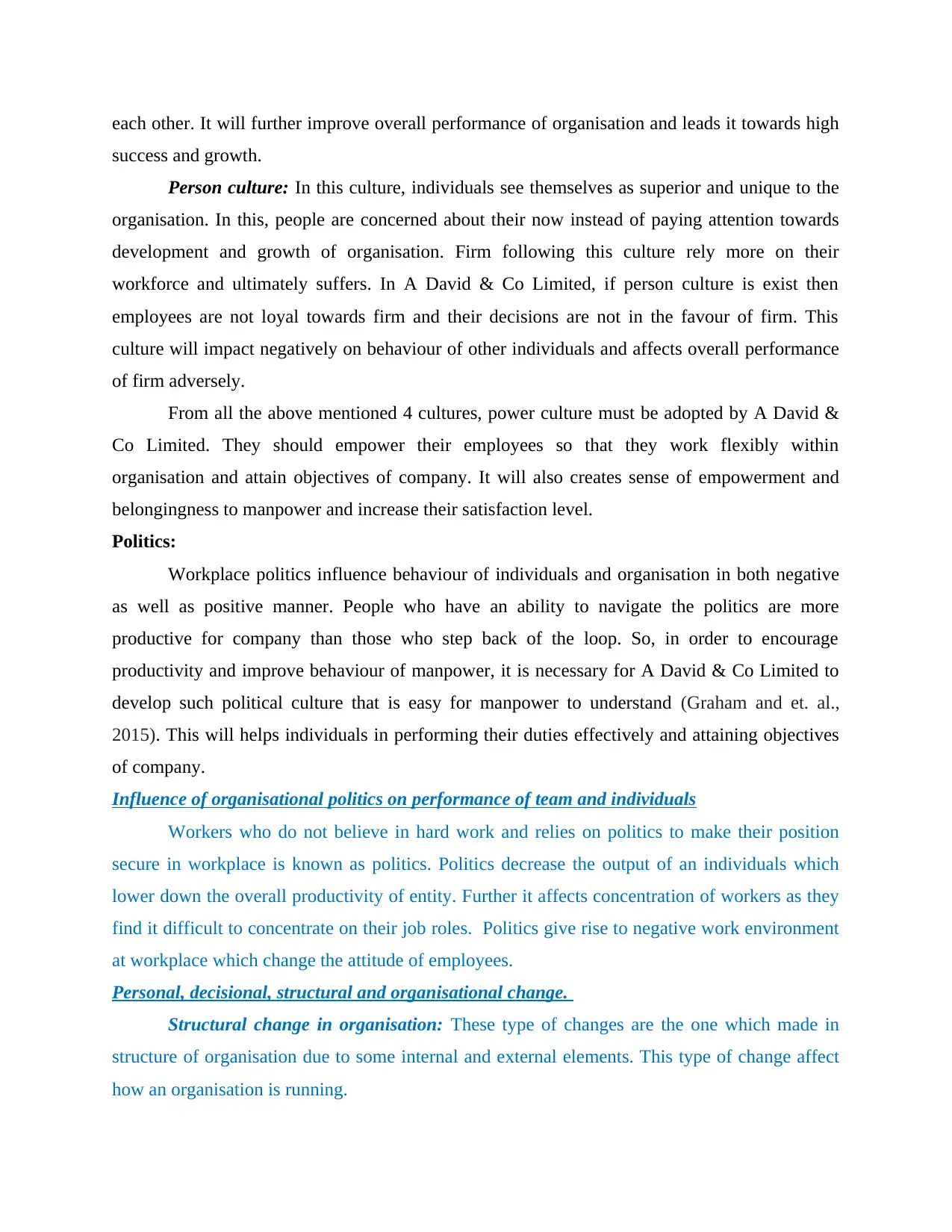
each other. It will further improve overall performance of organisation and leads it towards high
success and growth.
Person culture: In this culture, individuals see themselves as superior and unique to the
organisation. In this, people are concerned about their now instead of paying attention towards
development and growth of organisation. Firm following this culture rely more on their
workforce and ultimately suffers. In A David & Co Limited, if person culture is exist then
employees are not loyal towards firm and their decisions are not in the favour of firm. This
culture will impact negatively on behaviour of other individuals and affects overall performance
of firm adversely.
From all the above mentioned 4 cultures, power culture must be adopted by A David &
Co Limited. They should empower their employees so that they work flexibly within
organisation and attain objectives of company. It will also creates sense of empowerment and
belongingness to manpower and increase their satisfaction level.
Politics:
Workplace politics influence behaviour of individuals and organisation in both negative
as well as positive manner. People who have an ability to navigate the politics are more
productive for company than those who step back of the loop. So, in order to encourage
productivity and improve behaviour of manpower, it is necessary for A David & Co Limited to
develop such political culture that is easy for manpower to understand (Graham and et. al.,
2015). This will helps individuals in performing their duties effectively and attaining objectives
of company.
Influence of organisational politics on performance of team and individuals
Workers who do not believe in hard work and relies on politics to make their position
secure in workplace is known as politics. Politics decrease the output of an individuals which
lower down the overall productivity of entity. Further it affects concentration of workers as they
find it difficult to concentrate on their job roles. Politics give rise to negative work environment
at workplace which change the attitude of employees.
Personal, decisional, structural and organisational change.
Structural change in organisation: These type of changes are the one which made in
structure of organisation due to some internal and external elements. This type of change affect
how an organisation is running.
success and growth.
Person culture: In this culture, individuals see themselves as superior and unique to the
organisation. In this, people are concerned about their now instead of paying attention towards
development and growth of organisation. Firm following this culture rely more on their
workforce and ultimately suffers. In A David & Co Limited, if person culture is exist then
employees are not loyal towards firm and their decisions are not in the favour of firm. This
culture will impact negatively on behaviour of other individuals and affects overall performance
of firm adversely.
From all the above mentioned 4 cultures, power culture must be adopted by A David &
Co Limited. They should empower their employees so that they work flexibly within
organisation and attain objectives of company. It will also creates sense of empowerment and
belongingness to manpower and increase their satisfaction level.
Politics:
Workplace politics influence behaviour of individuals and organisation in both negative
as well as positive manner. People who have an ability to navigate the politics are more
productive for company than those who step back of the loop. So, in order to encourage
productivity and improve behaviour of manpower, it is necessary for A David & Co Limited to
develop such political culture that is easy for manpower to understand (Graham and et. al.,
2015). This will helps individuals in performing their duties effectively and attaining objectives
of company.
Influence of organisational politics on performance of team and individuals
Workers who do not believe in hard work and relies on politics to make their position
secure in workplace is known as politics. Politics decrease the output of an individuals which
lower down the overall productivity of entity. Further it affects concentration of workers as they
find it difficult to concentrate on their job roles. Politics give rise to negative work environment
at workplace which change the attitude of employees.
Personal, decisional, structural and organisational change.
Structural change in organisation: These type of changes are the one which made in
structure of organisation due to some internal and external elements. This type of change affect
how an organisation is running.
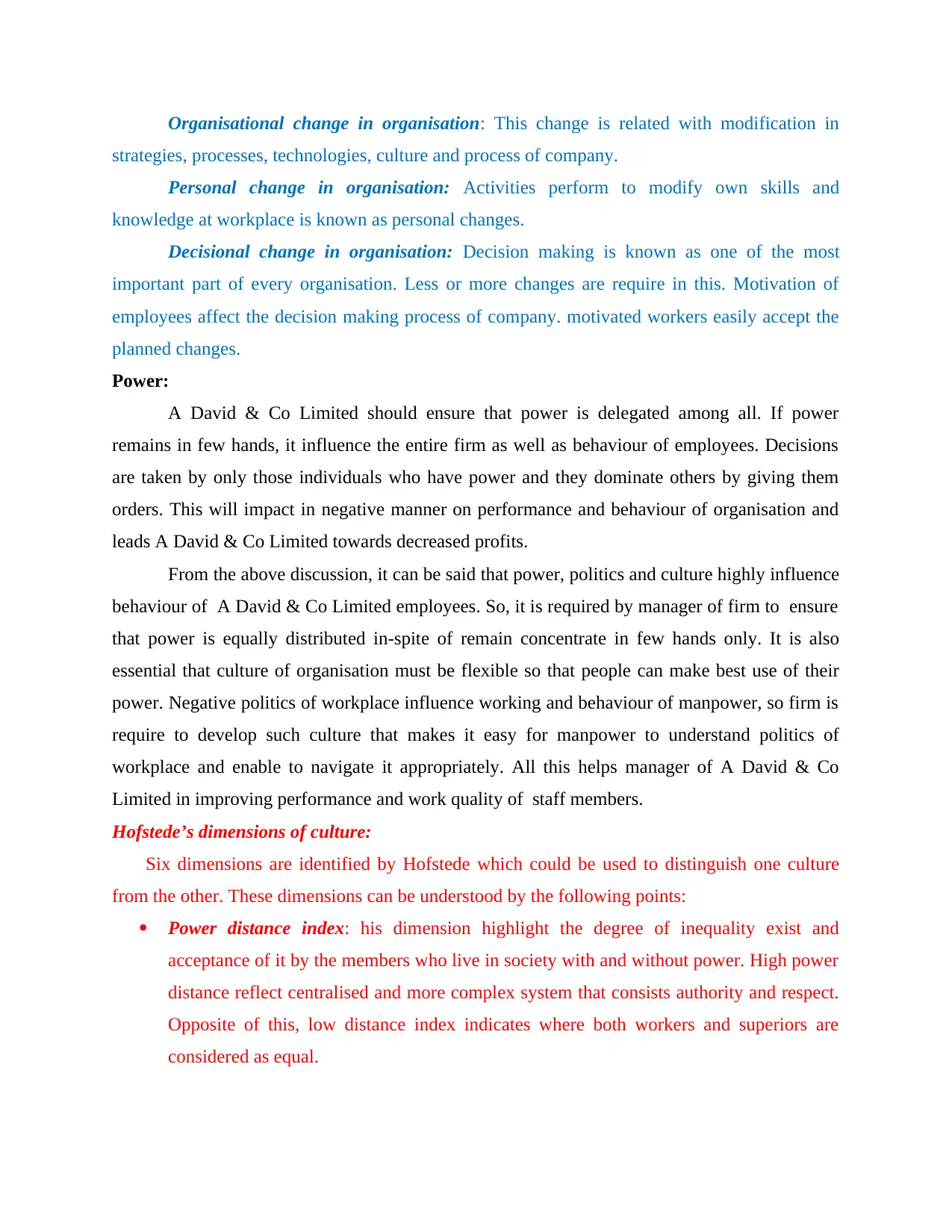
Organisational change in organisation: This change is related with modification in
strategies, processes, technologies, culture and process of company.
Personal change in organisation: Activities perform to modify own skills and
knowledge at workplace is known as personal changes.
Decisional change in organisation: Decision making is known as one of the most
important part of every organisation. Less or more changes are require in this. Motivation of
employees affect the decision making process of company. motivated workers easily accept the
planned changes.
Power:
A David & Co Limited should ensure that power is delegated among all. If power
remains in few hands, it influence the entire firm as well as behaviour of employees. Decisions
are taken by only those individuals who have power and they dominate others by giving them
orders. This will impact in negative manner on performance and behaviour of organisation and
leads A David & Co Limited towards decreased profits.
From the above discussion, it can be said that power, politics and culture highly influence
behaviour of A David & Co Limited employees. So, it is required by manager of firm to ensure
that power is equally distributed in-spite of remain concentrate in few hands only. It is also
essential that culture of organisation must be flexible so that people can make best use of their
power. Negative politics of workplace influence working and behaviour of manpower, so firm is
require to develop such culture that makes it easy for manpower to understand politics of
workplace and enable to navigate it appropriately. All this helps manager of A David & Co
Limited in improving performance and work quality of staff members.
Hofstede’s dimensions of culture:
Six dimensions are identified by Hofstede which could be used to distinguish one culture
from the other. These dimensions can be understood by the following points:
Power distance index: his dimension highlight the degree of inequality exist and
acceptance of it by the members who live in society with and without power. High power
distance reflect centralised and more complex system that consists authority and respect.
Opposite of this, low distance index indicates where both workers and superiors are
considered as equal.
strategies, processes, technologies, culture and process of company.
Personal change in organisation: Activities perform to modify own skills and
knowledge at workplace is known as personal changes.
Decisional change in organisation: Decision making is known as one of the most
important part of every organisation. Less or more changes are require in this. Motivation of
employees affect the decision making process of company. motivated workers easily accept the
planned changes.
Power:
A David & Co Limited should ensure that power is delegated among all. If power
remains in few hands, it influence the entire firm as well as behaviour of employees. Decisions
are taken by only those individuals who have power and they dominate others by giving them
orders. This will impact in negative manner on performance and behaviour of organisation and
leads A David & Co Limited towards decreased profits.
From the above discussion, it can be said that power, politics and culture highly influence
behaviour of A David & Co Limited employees. So, it is required by manager of firm to ensure
that power is equally distributed in-spite of remain concentrate in few hands only. It is also
essential that culture of organisation must be flexible so that people can make best use of their
power. Negative politics of workplace influence working and behaviour of manpower, so firm is
require to develop such culture that makes it easy for manpower to understand politics of
workplace and enable to navigate it appropriately. All this helps manager of A David & Co
Limited in improving performance and work quality of staff members.
Hofstede’s dimensions of culture:
Six dimensions are identified by Hofstede which could be used to distinguish one culture
from the other. These dimensions can be understood by the following points:
Power distance index: his dimension highlight the degree of inequality exist and
acceptance of it by the members who live in society with and without power. High power
distance reflect centralised and more complex system that consists authority and respect.
Opposite of this, low distance index indicates where both workers and superiors are
considered as equal.
⊘ This is a preview!⊘
Do you want full access?
Subscribe today to unlock all pages.

Trusted by 1+ million students worldwide
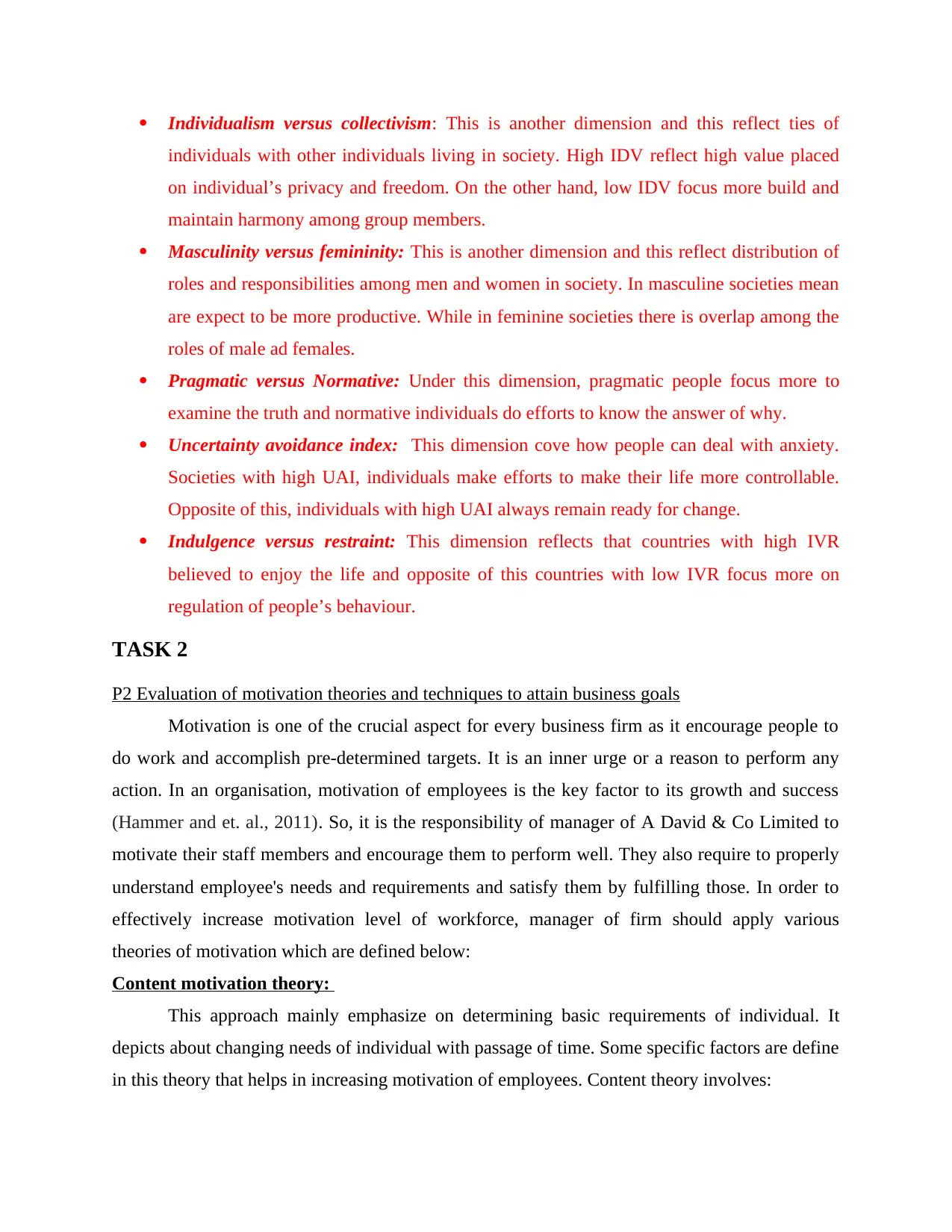
Individualism versus collectivism: This is another dimension and this reflect ties of
individuals with other individuals living in society. High IDV reflect high value placed
on individual’s privacy and freedom. On the other hand, low IDV focus more build and
maintain harmony among group members.
Masculinity versus femininity: This is another dimension and this reflect distribution of
roles and responsibilities among men and women in society. In masculine societies mean
are expect to be more productive. While in feminine societies there is overlap among the
roles of male ad females.
Pragmatic versus Normative: Under this dimension, pragmatic people focus more to
examine the truth and normative individuals do efforts to know the answer of why.
Uncertainty avoidance index: This dimension cove how people can deal with anxiety.
Societies with high UAI, individuals make efforts to make their life more controllable.
Opposite of this, individuals with high UAI always remain ready for change.
Indulgence versus restraint: This dimension reflects that countries with high IVR
believed to enjoy the life and opposite of this countries with low IVR focus more on
regulation of people’s behaviour.
TASK 2
P2 Evaluation of motivation theories and techniques to attain business goals
Motivation is one of the crucial aspect for every business firm as it encourage people to
do work and accomplish pre-determined targets. It is an inner urge or a reason to perform any
action. In an organisation, motivation of employees is the key factor to its growth and success
(Hammer and et. al., 2011). So, it is the responsibility of manager of A David & Co Limited to
motivate their staff members and encourage them to perform well. They also require to properly
understand employee's needs and requirements and satisfy them by fulfilling those. In order to
effectively increase motivation level of workforce, manager of firm should apply various
theories of motivation which are defined below:
Content motivation theory:
This approach mainly emphasize on determining basic requirements of individual. It
depicts about changing needs of individual with passage of time. Some specific factors are define
in this theory that helps in increasing motivation of employees. Content theory involves:
individuals with other individuals living in society. High IDV reflect high value placed
on individual’s privacy and freedom. On the other hand, low IDV focus more build and
maintain harmony among group members.
Masculinity versus femininity: This is another dimension and this reflect distribution of
roles and responsibilities among men and women in society. In masculine societies mean
are expect to be more productive. While in feminine societies there is overlap among the
roles of male ad females.
Pragmatic versus Normative: Under this dimension, pragmatic people focus more to
examine the truth and normative individuals do efforts to know the answer of why.
Uncertainty avoidance index: This dimension cove how people can deal with anxiety.
Societies with high UAI, individuals make efforts to make their life more controllable.
Opposite of this, individuals with high UAI always remain ready for change.
Indulgence versus restraint: This dimension reflects that countries with high IVR
believed to enjoy the life and opposite of this countries with low IVR focus more on
regulation of people’s behaviour.
TASK 2
P2 Evaluation of motivation theories and techniques to attain business goals
Motivation is one of the crucial aspect for every business firm as it encourage people to
do work and accomplish pre-determined targets. It is an inner urge or a reason to perform any
action. In an organisation, motivation of employees is the key factor to its growth and success
(Hammer and et. al., 2011). So, it is the responsibility of manager of A David & Co Limited to
motivate their staff members and encourage them to perform well. They also require to properly
understand employee's needs and requirements and satisfy them by fulfilling those. In order to
effectively increase motivation level of workforce, manager of firm should apply various
theories of motivation which are defined below:
Content motivation theory:
This approach mainly emphasize on determining basic requirements of individual. It
depicts about changing needs of individual with passage of time. Some specific factors are define
in this theory that helps in increasing motivation of employees. Content theory involves:
Paraphrase This Document
Need a fresh take? Get an instant paraphrase of this document with our AI Paraphraser
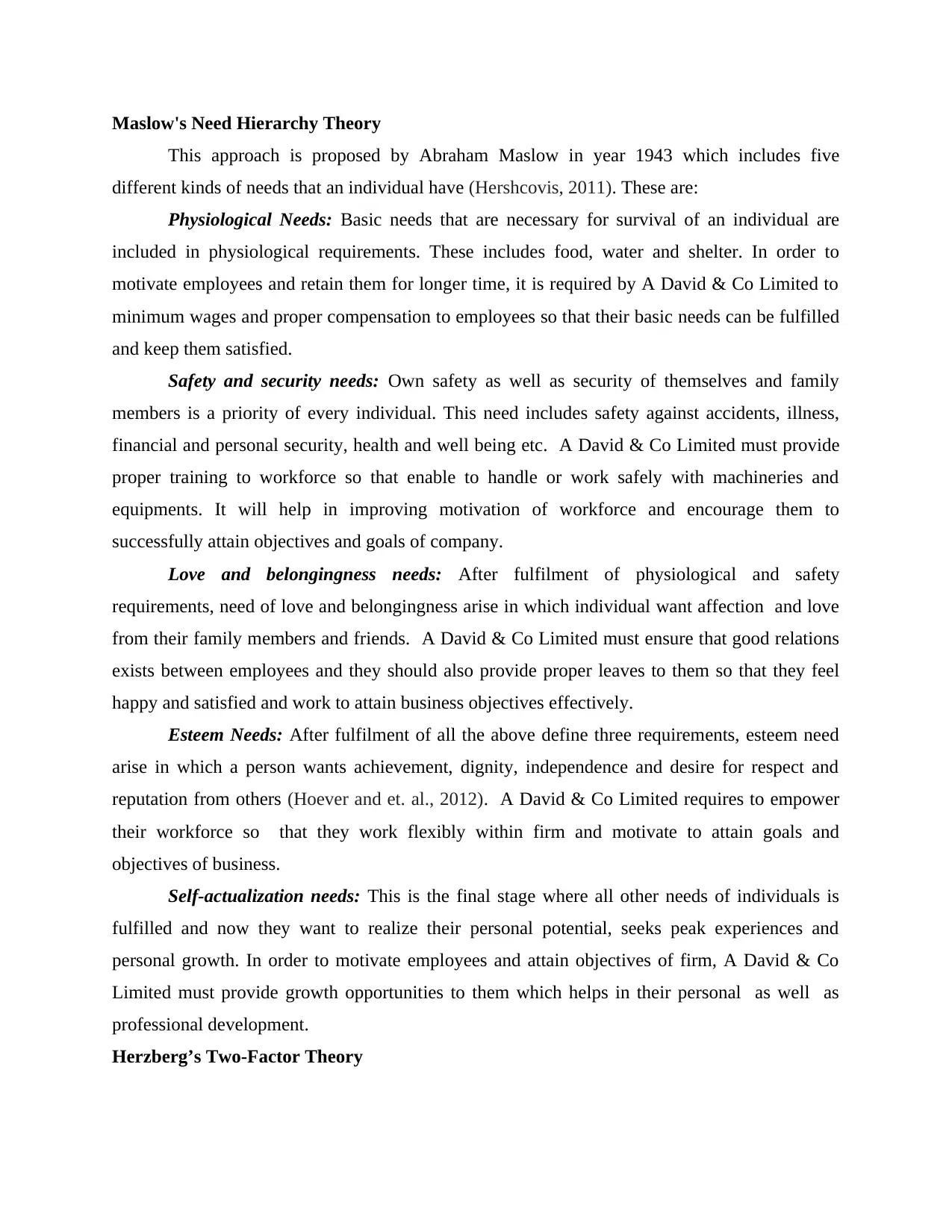
Maslow's Need Hierarchy Theory
This approach is proposed by Abraham Maslow in year 1943 which includes five
different kinds of needs that an individual have (Hershcovis, 2011). These are:
Physiological Needs: Basic needs that are necessary for survival of an individual are
included in physiological requirements. These includes food, water and shelter. In order to
motivate employees and retain them for longer time, it is required by A David & Co Limited to
minimum wages and proper compensation to employees so that their basic needs can be fulfilled
and keep them satisfied.
Safety and security needs: Own safety as well as security of themselves and family
members is a priority of every individual. This need includes safety against accidents, illness,
financial and personal security, health and well being etc. A David & Co Limited must provide
proper training to workforce so that enable to handle or work safely with machineries and
equipments. It will help in improving motivation of workforce and encourage them to
successfully attain objectives and goals of company.
Love and belongingness needs: After fulfilment of physiological and safety
requirements, need of love and belongingness arise in which individual want affection and love
from their family members and friends. A David & Co Limited must ensure that good relations
exists between employees and they should also provide proper leaves to them so that they feel
happy and satisfied and work to attain business objectives effectively.
Esteem Needs: After fulfilment of all the above define three requirements, esteem need
arise in which a person wants achievement, dignity, independence and desire for respect and
reputation from others (Hoever and et. al., 2012). A David & Co Limited requires to empower
their workforce so that they work flexibly within firm and motivate to attain goals and
objectives of business.
Self-actualization needs: This is the final stage where all other needs of individuals is
fulfilled and now they want to realize their personal potential, seeks peak experiences and
personal growth. In order to motivate employees and attain objectives of firm, A David & Co
Limited must provide growth opportunities to them which helps in their personal as well as
professional development.
Herzberg’s Two-Factor Theory
This approach is proposed by Abraham Maslow in year 1943 which includes five
different kinds of needs that an individual have (Hershcovis, 2011). These are:
Physiological Needs: Basic needs that are necessary for survival of an individual are
included in physiological requirements. These includes food, water and shelter. In order to
motivate employees and retain them for longer time, it is required by A David & Co Limited to
minimum wages and proper compensation to employees so that their basic needs can be fulfilled
and keep them satisfied.
Safety and security needs: Own safety as well as security of themselves and family
members is a priority of every individual. This need includes safety against accidents, illness,
financial and personal security, health and well being etc. A David & Co Limited must provide
proper training to workforce so that enable to handle or work safely with machineries and
equipments. It will help in improving motivation of workforce and encourage them to
successfully attain objectives and goals of company.
Love and belongingness needs: After fulfilment of physiological and safety
requirements, need of love and belongingness arise in which individual want affection and love
from their family members and friends. A David & Co Limited must ensure that good relations
exists between employees and they should also provide proper leaves to them so that they feel
happy and satisfied and work to attain business objectives effectively.
Esteem Needs: After fulfilment of all the above define three requirements, esteem need
arise in which a person wants achievement, dignity, independence and desire for respect and
reputation from others (Hoever and et. al., 2012). A David & Co Limited requires to empower
their workforce so that they work flexibly within firm and motivate to attain goals and
objectives of business.
Self-actualization needs: This is the final stage where all other needs of individuals is
fulfilled and now they want to realize their personal potential, seeks peak experiences and
personal growth. In order to motivate employees and attain objectives of firm, A David & Co
Limited must provide growth opportunities to them which helps in their personal as well as
professional development.
Herzberg’s Two-Factor Theory
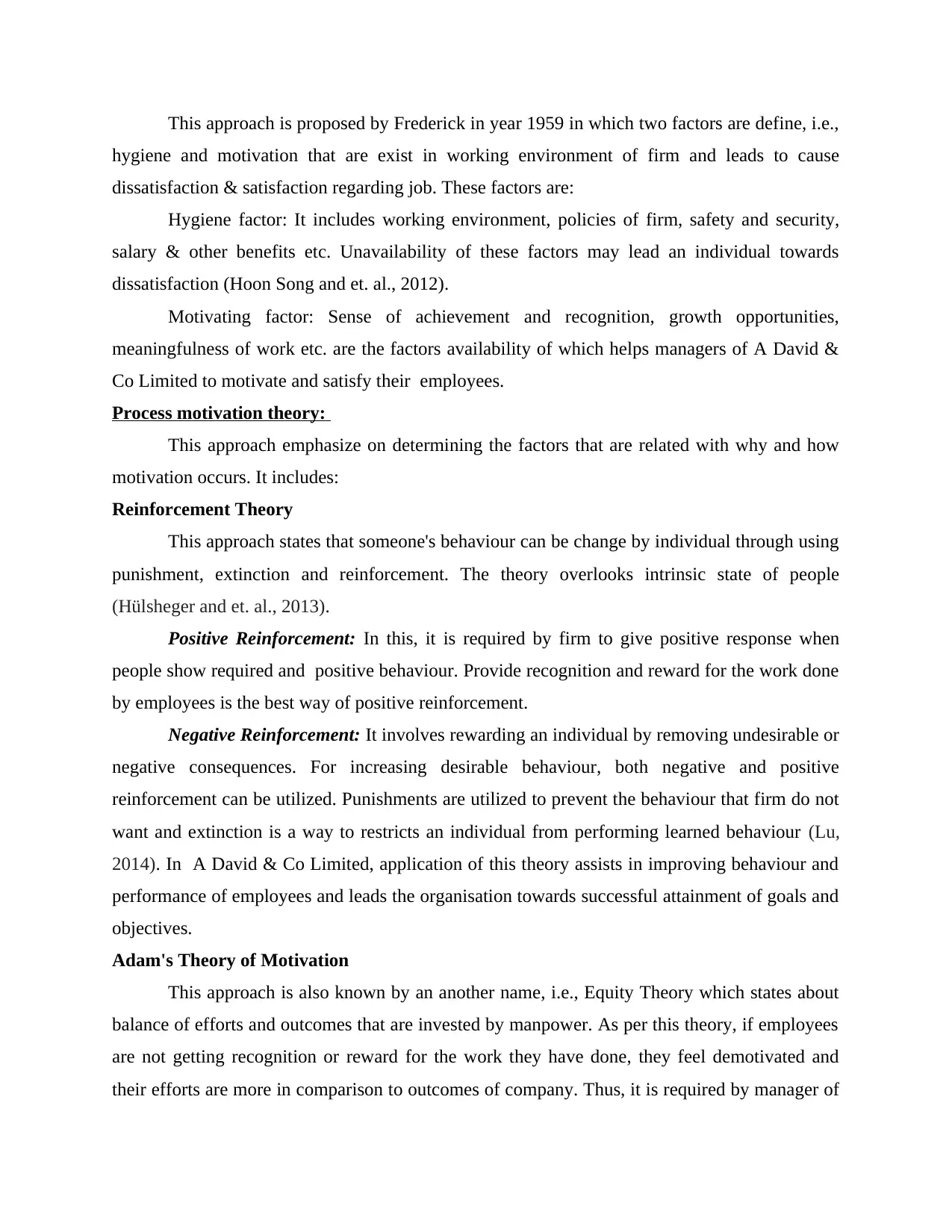
This approach is proposed by Frederick in year 1959 in which two factors are define, i.e.,
hygiene and motivation that are exist in working environment of firm and leads to cause
dissatisfaction & satisfaction regarding job. These factors are:
Hygiene factor: It includes working environment, policies of firm, safety and security,
salary & other benefits etc. Unavailability of these factors may lead an individual towards
dissatisfaction (Hoon Song and et. al., 2012).
Motivating factor: Sense of achievement and recognition, growth opportunities,
meaningfulness of work etc. are the factors availability of which helps managers of A David &
Co Limited to motivate and satisfy their employees.
Process motivation theory:
This approach emphasize on determining the factors that are related with why and how
motivation occurs. It includes:
Reinforcement Theory
This approach states that someone's behaviour can be change by individual through using
punishment, extinction and reinforcement. The theory overlooks intrinsic state of people
(Hülsheger and et. al., 2013).
Positive Reinforcement: In this, it is required by firm to give positive response when
people show required and positive behaviour. Provide recognition and reward for the work done
by employees is the best way of positive reinforcement.
Negative Reinforcement: It involves rewarding an individual by removing undesirable or
negative consequences. For increasing desirable behaviour, both negative and positive
reinforcement can be utilized. Punishments are utilized to prevent the behaviour that firm do not
want and extinction is a way to restricts an individual from performing learned behaviour (Lu,
2014). In A David & Co Limited, application of this theory assists in improving behaviour and
performance of employees and leads the organisation towards successful attainment of goals and
objectives.
Adam's Theory of Motivation
This approach is also known by an another name, i.e., Equity Theory which states about
balance of efforts and outcomes that are invested by manpower. As per this theory, if employees
are not getting recognition or reward for the work they have done, they feel demotivated and
their efforts are more in comparison to outcomes of company. Thus, it is required by manager of
hygiene and motivation that are exist in working environment of firm and leads to cause
dissatisfaction & satisfaction regarding job. These factors are:
Hygiene factor: It includes working environment, policies of firm, safety and security,
salary & other benefits etc. Unavailability of these factors may lead an individual towards
dissatisfaction (Hoon Song and et. al., 2012).
Motivating factor: Sense of achievement and recognition, growth opportunities,
meaningfulness of work etc. are the factors availability of which helps managers of A David &
Co Limited to motivate and satisfy their employees.
Process motivation theory:
This approach emphasize on determining the factors that are related with why and how
motivation occurs. It includes:
Reinforcement Theory
This approach states that someone's behaviour can be change by individual through using
punishment, extinction and reinforcement. The theory overlooks intrinsic state of people
(Hülsheger and et. al., 2013).
Positive Reinforcement: In this, it is required by firm to give positive response when
people show required and positive behaviour. Provide recognition and reward for the work done
by employees is the best way of positive reinforcement.
Negative Reinforcement: It involves rewarding an individual by removing undesirable or
negative consequences. For increasing desirable behaviour, both negative and positive
reinforcement can be utilized. Punishments are utilized to prevent the behaviour that firm do not
want and extinction is a way to restricts an individual from performing learned behaviour (Lu,
2014). In A David & Co Limited, application of this theory assists in improving behaviour and
performance of employees and leads the organisation towards successful attainment of goals and
objectives.
Adam's Theory of Motivation
This approach is also known by an another name, i.e., Equity Theory which states about
balance of efforts and outcomes that are invested by manpower. As per this theory, if employees
are not getting recognition or reward for the work they have done, they feel demotivated and
their efforts are more in comparison to outcomes of company. Thus, it is required by manager of
⊘ This is a preview!⊘
Do you want full access?
Subscribe today to unlock all pages.

Trusted by 1+ million students worldwide
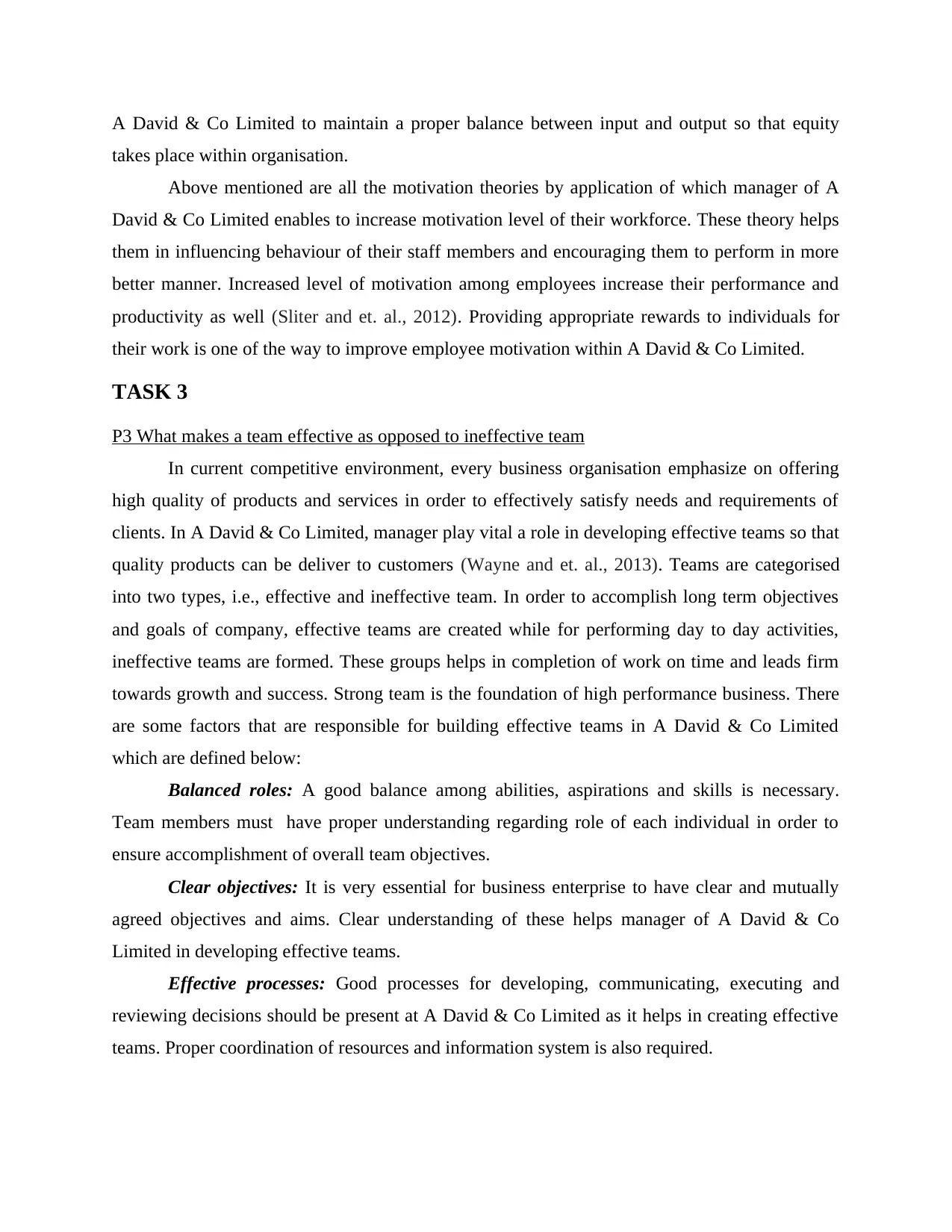
A David & Co Limited to maintain a proper balance between input and output so that equity
takes place within organisation.
Above mentioned are all the motivation theories by application of which manager of A
David & Co Limited enables to increase motivation level of their workforce. These theory helps
them in influencing behaviour of their staff members and encouraging them to perform in more
better manner. Increased level of motivation among employees increase their performance and
productivity as well (Sliter and et. al., 2012). Providing appropriate rewards to individuals for
their work is one of the way to improve employee motivation within A David & Co Limited.
TASK 3
P3 What makes a team effective as opposed to ineffective team
In current competitive environment, every business organisation emphasize on offering
high quality of products and services in order to effectively satisfy needs and requirements of
clients. In A David & Co Limited, manager play vital a role in developing effective teams so that
quality products can be deliver to customers (Wayne and et. al., 2013). Teams are categorised
into two types, i.e., effective and ineffective team. In order to accomplish long term objectives
and goals of company, effective teams are created while for performing day to day activities,
ineffective teams are formed. These groups helps in completion of work on time and leads firm
towards growth and success. Strong team is the foundation of high performance business. There
are some factors that are responsible for building effective teams in A David & Co Limited
which are defined below:
Balanced roles: A good balance among abilities, aspirations and skills is necessary.
Team members must have proper understanding regarding role of each individual in order to
ensure accomplishment of overall team objectives.
Clear objectives: It is very essential for business enterprise to have clear and mutually
agreed objectives and aims. Clear understanding of these helps manager of A David & Co
Limited in developing effective teams.
Effective processes: Good processes for developing, communicating, executing and
reviewing decisions should be present at A David & Co Limited as it helps in creating effective
teams. Proper coordination of resources and information system is also required.
takes place within organisation.
Above mentioned are all the motivation theories by application of which manager of A
David & Co Limited enables to increase motivation level of their workforce. These theory helps
them in influencing behaviour of their staff members and encouraging them to perform in more
better manner. Increased level of motivation among employees increase their performance and
productivity as well (Sliter and et. al., 2012). Providing appropriate rewards to individuals for
their work is one of the way to improve employee motivation within A David & Co Limited.
TASK 3
P3 What makes a team effective as opposed to ineffective team
In current competitive environment, every business organisation emphasize on offering
high quality of products and services in order to effectively satisfy needs and requirements of
clients. In A David & Co Limited, manager play vital a role in developing effective teams so that
quality products can be deliver to customers (Wayne and et. al., 2013). Teams are categorised
into two types, i.e., effective and ineffective team. In order to accomplish long term objectives
and goals of company, effective teams are created while for performing day to day activities,
ineffective teams are formed. These groups helps in completion of work on time and leads firm
towards growth and success. Strong team is the foundation of high performance business. There
are some factors that are responsible for building effective teams in A David & Co Limited
which are defined below:
Balanced roles: A good balance among abilities, aspirations and skills is necessary.
Team members must have proper understanding regarding role of each individual in order to
ensure accomplishment of overall team objectives.
Clear objectives: It is very essential for business enterprise to have clear and mutually
agreed objectives and aims. Clear understanding of these helps manager of A David & Co
Limited in developing effective teams.
Effective processes: Good processes for developing, communicating, executing and
reviewing decisions should be present at A David & Co Limited as it helps in creating effective
teams. Proper coordination of resources and information system is also required.
Paraphrase This Document
Need a fresh take? Get an instant paraphrase of this document with our AI Paraphraser
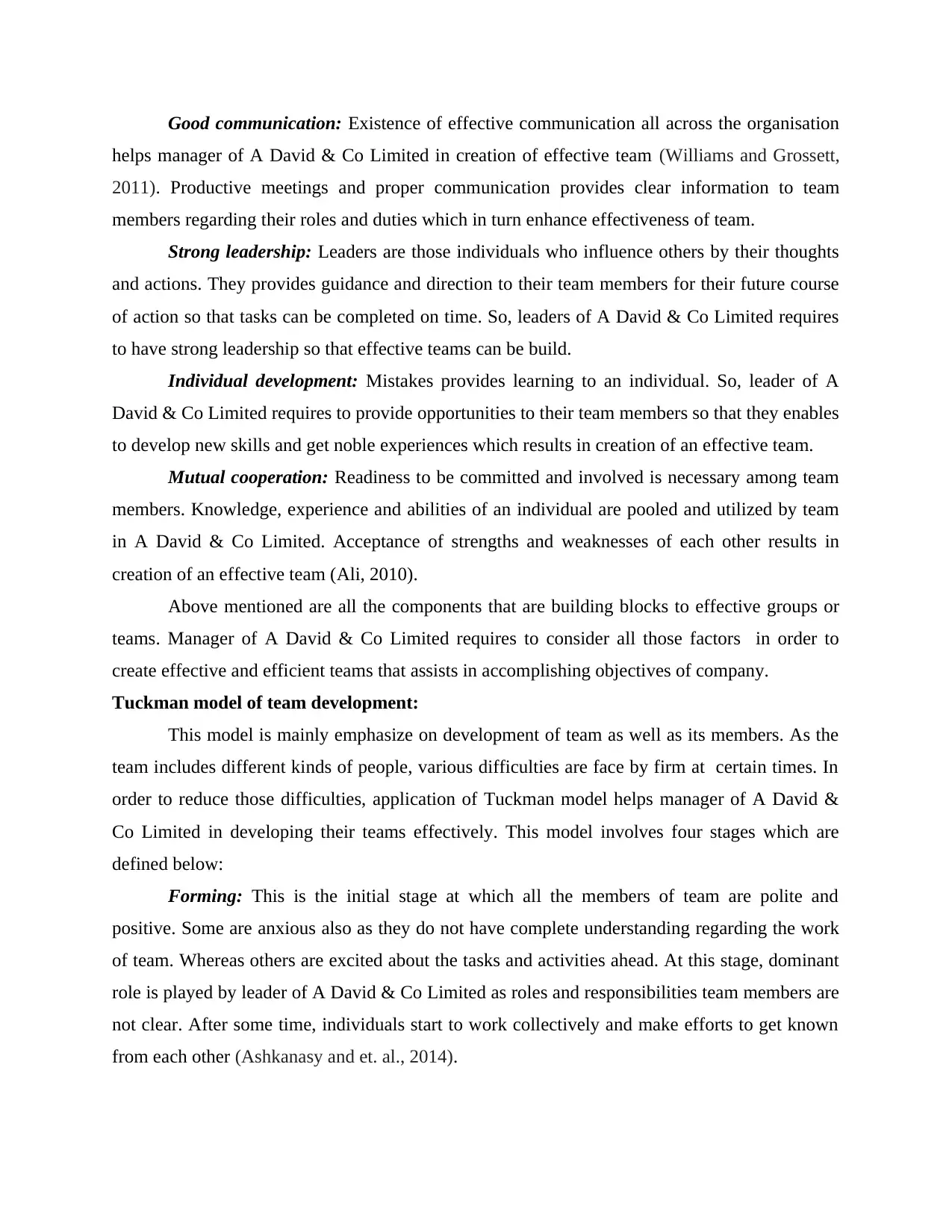
Good communication: Existence of effective communication all across the organisation
helps manager of A David & Co Limited in creation of effective team (Williams and Grossett,
2011). Productive meetings and proper communication provides clear information to team
members regarding their roles and duties which in turn enhance effectiveness of team.
Strong leadership: Leaders are those individuals who influence others by their thoughts
and actions. They provides guidance and direction to their team members for their future course
of action so that tasks can be completed on time. So, leaders of A David & Co Limited requires
to have strong leadership so that effective teams can be build.
Individual development: Mistakes provides learning to an individual. So, leader of A
David & Co Limited requires to provide opportunities to their team members so that they enables
to develop new skills and get noble experiences which results in creation of an effective team.
Mutual cooperation: Readiness to be committed and involved is necessary among team
members. Knowledge, experience and abilities of an individual are pooled and utilized by team
in A David & Co Limited. Acceptance of strengths and weaknesses of each other results in
creation of an effective team (Ali, 2010).
Above mentioned are all the components that are building blocks to effective groups or
teams. Manager of A David & Co Limited requires to consider all those factors in order to
create effective and efficient teams that assists in accomplishing objectives of company.
Tuckman model of team development:
This model is mainly emphasize on development of team as well as its members. As the
team includes different kinds of people, various difficulties are face by firm at certain times. In
order to reduce those difficulties, application of Tuckman model helps manager of A David &
Co Limited in developing their teams effectively. This model involves four stages which are
defined below:
Forming: This is the initial stage at which all the members of team are polite and
positive. Some are anxious also as they do not have complete understanding regarding the work
of team. Whereas others are excited about the tasks and activities ahead. At this stage, dominant
role is played by leader of A David & Co Limited as roles and responsibilities team members are
not clear. After some time, individuals start to work collectively and make efforts to get known
from each other (Ashkanasy and et. al., 2014).
helps manager of A David & Co Limited in creation of effective team (Williams and Grossett,
2011). Productive meetings and proper communication provides clear information to team
members regarding their roles and duties which in turn enhance effectiveness of team.
Strong leadership: Leaders are those individuals who influence others by their thoughts
and actions. They provides guidance and direction to their team members for their future course
of action so that tasks can be completed on time. So, leaders of A David & Co Limited requires
to have strong leadership so that effective teams can be build.
Individual development: Mistakes provides learning to an individual. So, leader of A
David & Co Limited requires to provide opportunities to their team members so that they enables
to develop new skills and get noble experiences which results in creation of an effective team.
Mutual cooperation: Readiness to be committed and involved is necessary among team
members. Knowledge, experience and abilities of an individual are pooled and utilized by team
in A David & Co Limited. Acceptance of strengths and weaknesses of each other results in
creation of an effective team (Ali, 2010).
Above mentioned are all the components that are building blocks to effective groups or
teams. Manager of A David & Co Limited requires to consider all those factors in order to
create effective and efficient teams that assists in accomplishing objectives of company.
Tuckman model of team development:
This model is mainly emphasize on development of team as well as its members. As the
team includes different kinds of people, various difficulties are face by firm at certain times. In
order to reduce those difficulties, application of Tuckman model helps manager of A David &
Co Limited in developing their teams effectively. This model involves four stages which are
defined below:
Forming: This is the initial stage at which all the members of team are polite and
positive. Some are anxious also as they do not have complete understanding regarding the work
of team. Whereas others are excited about the tasks and activities ahead. At this stage, dominant
role is played by leader of A David & Co Limited as roles and responsibilities team members are
not clear. After some time, individuals start to work collectively and make efforts to get known
from each other (Ashkanasy and et. al., 2014).
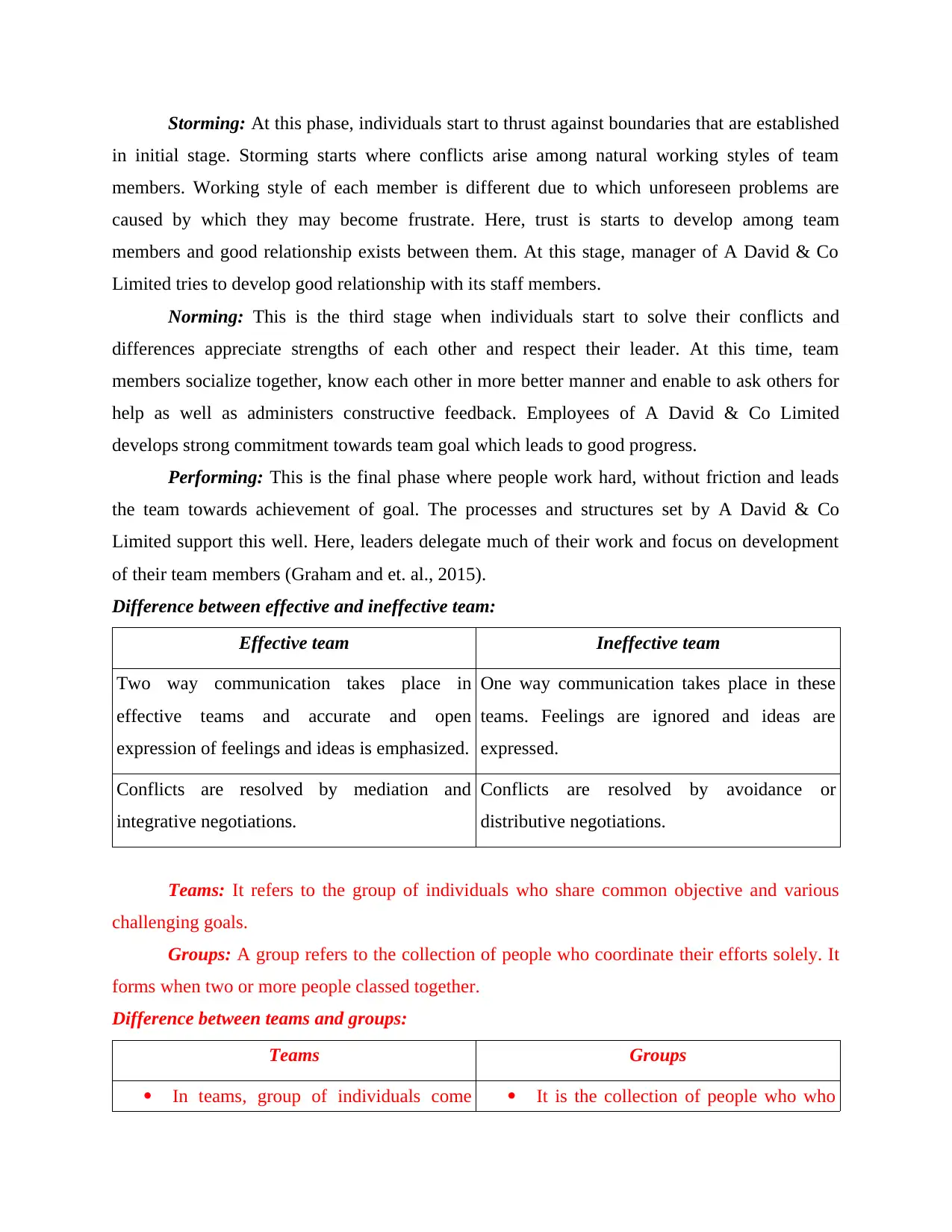
Storming: At this phase, individuals start to thrust against boundaries that are established
in initial stage. Storming starts where conflicts arise among natural working styles of team
members. Working style of each member is different due to which unforeseen problems are
caused by which they may become frustrate. Here, trust is starts to develop among team
members and good relationship exists between them. At this stage, manager of A David & Co
Limited tries to develop good relationship with its staff members.
Norming: This is the third stage when individuals start to solve their conflicts and
differences appreciate strengths of each other and respect their leader. At this time, team
members socialize together, know each other in more better manner and enable to ask others for
help as well as administers constructive feedback. Employees of A David & Co Limited
develops strong commitment towards team goal which leads to good progress.
Performing: This is the final phase where people work hard, without friction and leads
the team towards achievement of goal. The processes and structures set by A David & Co
Limited support this well. Here, leaders delegate much of their work and focus on development
of their team members (Graham and et. al., 2015).
Difference between effective and ineffective team:
Effective team Ineffective team
Two way communication takes place in
effective teams and accurate and open
expression of feelings and ideas is emphasized.
One way communication takes place in these
teams. Feelings are ignored and ideas are
expressed.
Conflicts are resolved by mediation and
integrative negotiations.
Conflicts are resolved by avoidance or
distributive negotiations.
Teams: It refers to the group of individuals who share common objective and various
challenging goals.
Groups: A group refers to the collection of people who coordinate their efforts solely. It
forms when two or more people classed together.
Difference between teams and groups:
Teams Groups
In teams, group of individuals come It is the collection of people who who
in initial stage. Storming starts where conflicts arise among natural working styles of team
members. Working style of each member is different due to which unforeseen problems are
caused by which they may become frustrate. Here, trust is starts to develop among team
members and good relationship exists between them. At this stage, manager of A David & Co
Limited tries to develop good relationship with its staff members.
Norming: This is the third stage when individuals start to solve their conflicts and
differences appreciate strengths of each other and respect their leader. At this time, team
members socialize together, know each other in more better manner and enable to ask others for
help as well as administers constructive feedback. Employees of A David & Co Limited
develops strong commitment towards team goal which leads to good progress.
Performing: This is the final phase where people work hard, without friction and leads
the team towards achievement of goal. The processes and structures set by A David & Co
Limited support this well. Here, leaders delegate much of their work and focus on development
of their team members (Graham and et. al., 2015).
Difference between effective and ineffective team:
Effective team Ineffective team
Two way communication takes place in
effective teams and accurate and open
expression of feelings and ideas is emphasized.
One way communication takes place in these
teams. Feelings are ignored and ideas are
expressed.
Conflicts are resolved by mediation and
integrative negotiations.
Conflicts are resolved by avoidance or
distributive negotiations.
Teams: It refers to the group of individuals who share common objective and various
challenging goals.
Groups: A group refers to the collection of people who coordinate their efforts solely. It
forms when two or more people classed together.
Difference between teams and groups:
Teams Groups
In teams, group of individuals come It is the collection of people who who
⊘ This is a preview!⊘
Do you want full access?
Subscribe today to unlock all pages.

Trusted by 1+ million students worldwide
1 out of 17
Related Documents
Your All-in-One AI-Powered Toolkit for Academic Success.
+13062052269
info@desklib.com
Available 24*7 on WhatsApp / Email
![[object Object]](/_next/static/media/star-bottom.7253800d.svg)
Unlock your academic potential
Copyright © 2020–2026 A2Z Services. All Rights Reserved. Developed and managed by ZUCOL.





